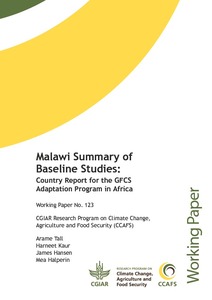Resource information
This report reflects the summary of baseline findings in Malawi, under the auspices of the Global Framework for Climate Services (GFCS) Adaptation Programme in Africa. It identifies gaps in climate information access and use at the local level, types of climate services farmers and pastoralists need in Malawi, relevant channels to reach farmers with requested services, lead-time and gender-specific requirements for the design and delivery of climate services that matter to farmers.
Scientific climate information is not used by the sampled farm households because they perceive this information as less reliable and not locally relevant to inform their cropping activities. Farmers need to be advised on improved cropping systems and agricultural technologies to minimize crop failure. In addition to information on climate, they would like to receive additional information on crop management and improved technologies. In addition, ensuring effective supply and availability of farm inputs (fertilizer, seeds) at the market will enhance farmers’ ability to act on the information received. Across districts, we found that women have access to climate information, but to a lesser extent than men. The reason may lie in the fact that women own fewer communication assets, particularly radios, and may be often too busy with household chores. A limited number of women are able to use the advice bundled with the climate information because of their lower control of productive resources and training.
Several key insights can be derived from this analysis and can inform the design of climate services activities in the districts targeted. First, climate information for households should rely primarily on radio and extension workers both from government and NGOs. Second, training key informants on climate forecast concepts and integrating them into agricultural activities is essential for the effective dissemination of climate information services. Third, supply of the markets with farm inputs will enable farmers to better act on the climate information received. Fourth, climate services products delivered to farmers should include forecasts on the onset of rainfall, frequency of extreme events, distribution of rainfall over the agricultural season and the end of the rainy season. Fifth, traditional indicators should be valued and integrated into the conventional climate forecasts to promote farmers’ use of scientific climate information in conjunction with their own indigenous knowledge. Finally and mostly critically, dialogue between national meteorology services, extension agents and farmers will represent an effective platform for the co-production of relevant and useful climate services for farmers.


